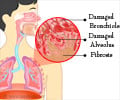Health Tips
There are certain steps that you can take to reduce the risk of developing bronchiectasis and to help with early diagnosis and treatment. These include:
- Avoid using cough suppressants, as suppressing a cough may aggravate the condition and delay diagnosis.
- Avoid smoking or being around other smokers, espcially when pregnant.
- Breastfeed your child to help boost immunity and lower his/her risk of infection.
- Follow a healthy and balanced meal plan to help boost immune function and reduce your risk of infections that could damage the lungs and cause bronchiectasis.
- Chest infections often seem trivial and nonthreatening, but should be dealt with promptly as deterioration of some of these conditions can cause damage that can later result in bronchiectasis.
- Be careful about your living environment. Living in cold and damp environments for extended periods increases the risk of serious chest infections.
- Get vaccinated against illnesses that are known to cause bronchiectasis, such as whooping cough.










